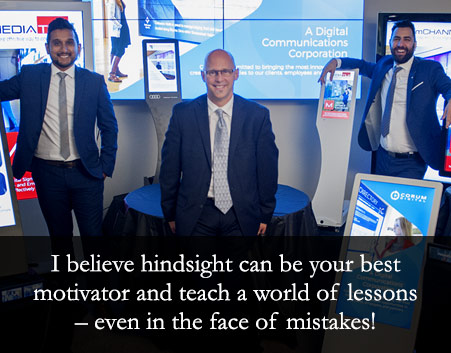THIS IS WHY CULTURE MATTERS. CULTURE EXCEEDS STRATEGY.
I believe hindsight can be your best motivator and teach a world of lessons – even in the face of mistakes!
I believe hindsight can be your best motivator and teach a world of lessons – even in the face of mistakes! Over the years, like everyone, I have made mistakes – unfortunately, some of those mistakes have been as a People Leader – tasked with defining and fostering a Team Culture.
In hindsight, I wish I had not made them, however, they have taught me so much about people and culture! I am so appreciative for what the people on my team have taught me over the years, and how much we can learn by listening and engaging with ALL your Employees.
Our workplaces, should not be somewhere your Employees dread coming into. In fact, it should be a place where they come to grow, engage, and have their voices heard. They should look forward to work, and have a hard time leaving at the end of the day because of the camaraderie, challenges, and atmosphere. While the tasks may prove to be difficult, the culture shouldn’t add to the stress of the work. On the contrary, the culture should be built to withstand work related stress.
This is why culture matters. Culture trumps strategy.
Over the years, I have learned that every individual has ideas, has thoughts, and can add value – albeit at different rates of speed, at different times, and in THEIR own unique way. Thus, is it prudent that we treat everyone the same?
Short answer, hell no!
In a joint study by Columbia University and Duke University, Culture makes a difference:
Almost all respondents agreed that corporate culture, however it is defined, makes a difference in companies’ performance and value. Among the findings:
- More than 90% said that culture was important at their firms.
- 92% said they believed improving their firm’s corporate culture would improve the value of the company.
- More than 50% said corporate culture influences productivity, creativity, profitability, firm value and growth rates.
- Only 15% said their firm’s corporate culture was where it needed to be.
So back to my lessons learned along the road of hard knocks – or shall I say, my mistakes! When setting a foundation for Culture, it is about engaging and knowing your Employees. Treat everyone differently, and in a way that meshes with how they best perform. Spend time with them, just listening, and engaging. The minute you allow them to be them, is when you have propelled your relationship, and taken an active role in leading Corporate Culture. Provide encouragement to your Employees to take risks, give their thoughts, and be heard – many of the things that Employees are looking for at work are often outside of compensation, such as:
- Learn and grow in their jobs
- Do work that is challenging and meaningful
- Work with good people
- Feel like they are a valued team member
- Work with good bosses
- Be recognized for their contributions
- Be autonomous and feel in control of the work

As a Leader, in order to foster a great Corporate Culture, look to apply these insights:
- Make Employee Engagement a Commitment
Employee retention is critical to your organization’s success. Know your employees and their values. Support your employees, both professionally and personally. - Create an Exciting Environment
Focus on keeping spirits and energy up. Get to know what work excites them. Give employees challenging goals. Ask for input on something meaningful. Get employees involved in setting goals and driving the vision. Be both the coach and cheerleader! - People Come First
Today’s workforce seeks work/life balance. Acknowledge Employees unique skill sets and ideas, and value their time away from work. Try to promote a happy, productive, stress-free environment that acknowledges people have a life beyond work. Ask about their outside interests and get to know what excites them away from the office. - Lead More, Manage Less
Don’t swing at every pitch I say! Demonstrate your trust by giving employees more opportunities to direct their own time and work. Be open to creative ways of accomplishing work. Seek input from your Team, and model behaviours you want to see - praise and recognize Employees unique work and behaviour.
As one thinks about how best to bring a good Corporate Culture any Organization, start first with your Employees – they are the heartbeat of any Company. Don’t Manage, focus on Leading. Don’t swing at every pitch – and for heavens sake, listen to your Employees. You see, at one point, I used to micro-manage – I would dictate daily activities and routines, regardless if it meshed with the Employees working style, or methods for achievement. I would ask my whole Team to operate in the same manner, and drive the same way for the same results.
My regret is that I wasn’t focused on Individuals when tasked with defining and fostering a Team Culture. I was focused on activities, metrics, and end results – I was that guy, that boss – that swung at every pitch, and micro-managed. Fast forward to today, where I love my Team, and value everyone’s own unique perspective, and often seek it. My Team, and our Culture, is second to none!


